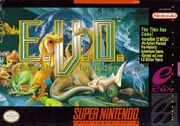
(E.V.O.'s American boxart)
E.V.O. Search for Eden (also known as 64 Okunen Monogatari in Japan) is a game for the SNES, that has been released in 1992.
It the second entry of the E.V.O. series, following the steps of the Japan-only PC-9801 game 46 Okunen Monogatari ~The Shinka Ron~.
Unlike the original game, which featured a top down view, E.V.O. is a 2D-sidescrolling platformer.
Plot[]
E.V.O. Search for Eden follows the journey of an ambigiously gendered, player controlled protagonist, as they progress through five eras. It starts around the time when Earth was mainly populated by aquatic life and ends with the early days of humanity.
The protagonist starts out as a small, violet fish, but as they progress through the story, they are guided by Gaia and evolve their body to become a stronger creature and to be able to survive a Darwinistic game of the "Survival of the Fittest", which means, that they need to compete with other creatures and remain victorious to advance.
Over the course of the game, the protagonist will become an amphibian and then a reptile. From there onwards, the protagonist can either stay a reptile or partake in one of two optional evolutionary paths, that allow them to become a bird or a mammal.
Aside from Gaia, they will also encounter a handful of friendly creatures like the Mars People, the Elder Ikustega, the Child Ikustega, the Warrior Ikustega, a dragonfly called Megausu, the Styracosaurus Father, the Styracosaurus Child, a Mammoth Gal, a herd of peaceful Stegosaurus and the whales.
The protagonists final goal, though, is to advance to the end of the fifth and final era and defeat Bolbox, who is their competitor in advancing to Eden, where Gaia lives and waits for them, so the one who proves their worth via completing the "Survival of the Fittest" game basically becomes god (or a goddess) and the father (or mother) to a race of creatures that reign supreme.
Miscellaneous[]
While the protagonist is able to become a human, they do not need to become a human. This can have amusing results like, for example, Gaia refererring to a godzilla-like, pink reptile or a golden dragon as a "human being".
In general, E.V.O. Search for Eden is often seen as a spiritual predecessor to Spore, which picks up the same principle, but extends it by starting at the cell stage and advancing up to the space-faring stage.
Differences between the Japanese and the English version[]
Despite being basically the same game, three differences have been found and documented by Semerone.
- The arrangement of the body parts available in the evolution menu has been rearranged.
- It is likely, that this was done to accommodate the Romaji in the English version, as the original Kanji and Furigana needed less space due to their nature of being words and syllables.
- The ingame font is normal in the Japanese version, while the English version uses a bold font.
- The damage done by the jumping attack has been decreased. If the protagonist jumps onto an enemy in the Japanese version, the damage done will be the same as if the protagonist tackled them. In the English version, the jump will do only half as much damage as the tackle.
- Colliding with an enemy will cause the player to get hurt, but also results in them being knocked back by a fair anmount in the Japanese version. This allows them to swim, walk or fly away from the foe to avoid further harm. In the English version, the player only receives a very minor knock back instead and, if they are very unlucky, can get themselves stuck in a cycle of hurting as a result.
Reference screenshots[]
[]
It goes like this:
"Jaws, Horn(s), Back of the Head, Neck, Body, Hands and Feet, Dorsal Fin, Tail"
It goes like this:
"Jaws, Horn(s), Neck, Body, Hands and Feet, Dorsal Fin, Tail, Back of the Head"




